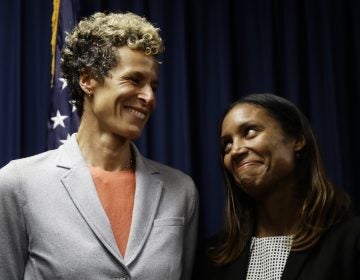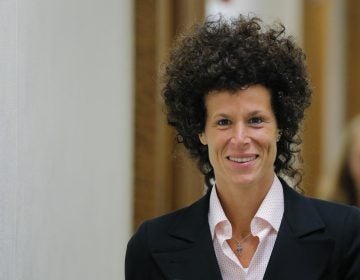Judge denies request to throw out Cosby charges, hears arguments on calling 19 past accusers
If the first morning of court arguments in the hearings ahead of Bill Cosby’s retrial are any barometer, hostility between both sides is poised to be high.
Listen 4:07
Bill Cosby arrives for a pretrial hearing in his sexual assault case at the Montgomery County Courthouse, Monday, March 5, 2018, in Norristown, Pa. (AP Photo/Matt Slocum)
Updated 7:15 p.m.
—
The judge overseeing the trial of Bill Cosby on Monday denied two attempts by the entertainer’s lawyers to have the case tossed, keeping the case on track to start in early April.
Montgomery County Judge Steven O’Neill ruled from the bench shortly after lunch during a pre-trial hearing, rejecting two separate motions to dismiss filed by the Cosby team alleging that prosecutors acted improperly and that there is not enough evidence to proceed to trial.
O’Neill did not decide on other issues over evidence at trial during the pre-trial hearing, which will resume on Tuesday.
The second half of the day was spent focused on the question of whether any past Cosby accusers will be permitted to confront the 80-year-old in front of a jury next month. It’s an issue that has gained new prominence and potency in the #MeToo era, with scores of women feeling newly empowered to publicly call out male abusers.
Prosecutors push to put more accusers on the stand
Prosecutors hope to call 19 women, including model Janice Dickinson, in addition to the main accuser, Andrea Constand, to show that the entertainer had a decades-long pattern of drugging and molesting women.
On Monday, prosecutors said calling the 19 other witnesses to testify will help show the jury Cosby’s “sadistic sexual script.”
Appearing at times skeptical of the thought of bringing in the additional accusers, suggesting that such a number may bias the jury against Cosby,O’Neill lobbed several questions at prosecutors about how the process can stay fair to the defendant if more than a dozen other women are sharing their own accounts of alleged assault.
Generally, so-called prior bad act witnesses can be brought in to show mental state or criminal intent. However, witnesses testifying about prior incidents are disqualified from taking the stand if it is intended to illuminate something about the defendant’s character, since courts have feared that would make a jury assume guilt without hearing all the evidence.
“That’s a lot of prior bad act witnesses,”O’Neill said. “I’m interesting in hearing from either side about the prejudice question.”
O’Neill last year allowed one other woman to testify against Cosby, but prosecutors argue a recent Pennsylvania Supreme Court case concerning so-called prior bad acts should allow all 19 other women to take the stand, a prospect Cosby’s legal team hopes to defeat.
The case is focused on the idea of “the doctrine of chances” — in other words, if an act happens time and time again, then it is not statistically likely that it would happen another time by mistake.
“For Ms. Constand to be fabricating the claim is improbable,” Assistant District Attorney Adrienne Jappe said. “[Cosby’s] not innocently enmeshed in this situation.”
The sexual assault incident at the heart of the trial allegedly happened more than 14 years ago when Constand was 30 years old and working for Temple University’s women’s basketball team. She met Cosby through the school and viewed him as an acquaintance and career mentor.
Constand says Cosby abused that relationship one night in early January 2004, when he invited her over to his mansion in Cheltenham, where Cosby gave her three pills to help her unwind. She had told the comedian that she was stressed out about her job and her future career prospects. She took them down with a glass a water. Then, at Cosby’s urging, she took a few sips of wine.
Constand has claimed she thought the pills were herbal. Cosby maintains the pills were Benedryl, though prosecutors have long said the pills were something much stronger. After Constand swallowed them, according to court documents, her knees became rubbery and she began to lose consciousness. At that point, prosecutors say Cosby assaulted her.
“Over the course of decades, he did the same thing to 19 other women in a strikingly similar fashion,” Jappe told the judge. “It’s all the recognizable handiwork of one person: the defendant.”
Cosby has long said the encounter was consensual.
After the incident, Constand left Philadelphia and moved to Canada to become a massage therapist.
Last summer, Constand retold this account to the jury, and this time, prosecutors plan to do the same.
Cosby’s defense team, meanwhile, has said in legal filings that Constand’s timeline of events contains several inconsistencies and that Cosby himself was not even in the Philadelphia area when Constand claims she was sexually assaulted.
Heightened hostility
If the first morning of court arguments in the hearings ahead of Bill Cosby’s retrial are any barometer, hostility between both sides is poised to be ramped up from the last time Cosby found himself in a criminal courtroom in Norristown.
Defense lawyer Kathleen Bliss pushed for an evidentiary hearing to determine whether prosecutors destroyed the notes of Margo Jackson, a former co-worker of accuser Andrea Constand who claims Constand planned to fabricate a claim against a famous person.
“I can say something illegal happened so I can later use that to extort a wealthy man to give me money so I can use it for my own finances and benefit,” said Bliss, summarizing what Jackson allegedly heard Constand say.
Jackson did not testify during Cosby’s first trial in 2017. Bliss said prosecutors knew Jackson’s testimony would undercut their case, they so went out of their way to ignore it.
“They did nothing to check out their own accuser. They went around the country and took copious notes as long as it was favorable to them,” Bliss said.
Montgomery County District Attorney Kevin Steele called the accusations that prosecutors destroyed notes and avoided inconvenient witnesses “conspiracy theories.”
“This whole request is asking you to do something that the law and the posture of this case absolutely does not support,” Steele said. “It’s a fishing expedition the defense is trying to go down at this point.”
Earlier, Steele tried to get Judge O’Neill to dump Cosby’s out-of-state lawyers for their “flat-out lies,” saying their allegations have been “reckless and false.”
The judge denied the motion asking that lawyers from outside Pennsylvania not be allowed in. But it illustrated that even a request as commonplace and uncontroversial as approving a defendant’s legal team has become a charged and divisive point.
“They have not earned their right to practice in Pennsylvania,” Steele told O’Neill.
The hearings ahead of Cosby’s second trial on aggravated indecent assault charges follow a jury last summer failing to reach a unanimous consensus after five days of intense deliberations behind closed doors. On June 17, 2017, O’Neill declared a mistrial, saying the jurors were hopelessly deadlocked over whether Cosby drugged and molested Constand.
In another line of attack, defense lawyer Beck James argued that phone records and Cosby’s travel schedule show that the alleged assault could not have occurred when Constand said it did, in early 2004. And if it happened before then, the case should be tossed, James said, because it would fall beyond the 12-year statute of limitations.
“This has gone on long enough,” James said. “It is a waste of resources. And it puts Mr. Cosby through an unnecessary prosecution.”
But prosecutors countered that debating the precise time of the incident is a dispute over fact, not a disagreement over law, saying that should be left for a jury to decide, not for a judge to rule on before a trial starts.
—
CORRECTION: An earlier version of this report referred to something Cosby said in a civil deposition related to an alleged assault he committed on Constand at a date prior to the night in question.
WHYY is your source for fact-based, in-depth journalism and information. As a nonprofit organization, we rely on financial support from readers like you. Please give today.




